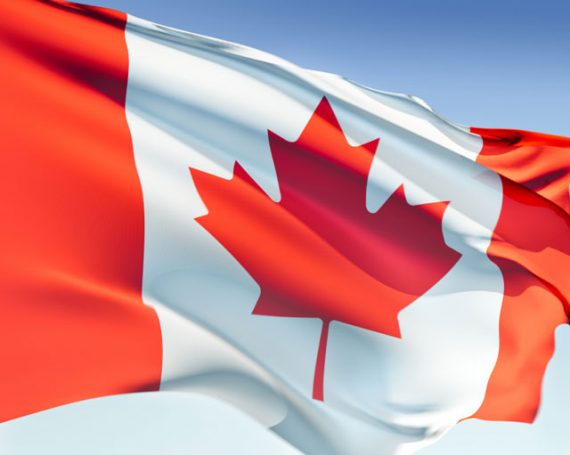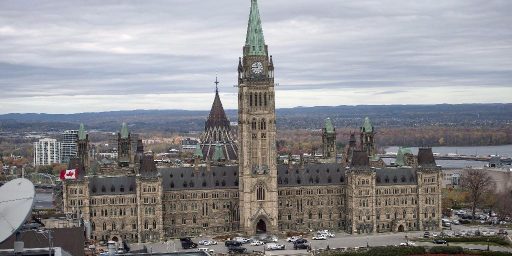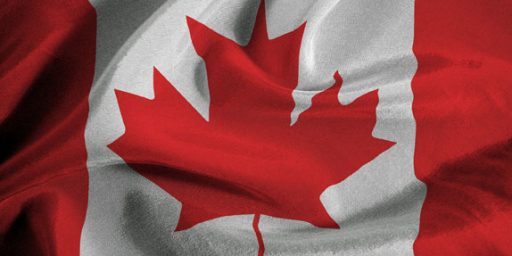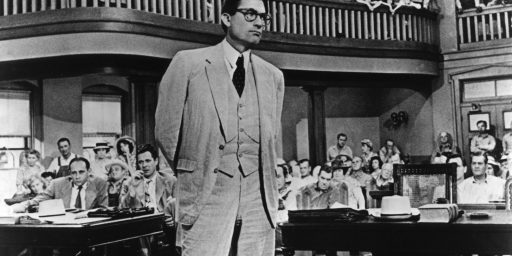As Goes Canada, So Goes….. Canada
Yesterday’s Canadian Parliamentary elections resulted in the first outright majority government in seven years, and a huge victory for Stephen Harper’s conservatives:
TORONTO — Conservative Prime Minister Stephen Harper won his coveted majority government in elections that changed Canada’s political landscape, with the opposition Liberals and Quebec separatists suffering a shattering defeat.
Harper, who took office in 2006, has won two elections but until Monday’s vote had never held a majority of Parliament’s 308 seats, forcing him to rely on the opposition to pass legislation.
Harper has deliberately avoided sweeping policy changes that could derail his government, but now has an opportunity to pass any legislation he wants with his new majority.
While Harper’s hold on Parliament has been tenuous during his five-year tenure, he has managed to nudge an instinctively center-left country to the right. He has gradually lowered sales and corporate taxes, avoided climate change legislation that would harm Alberta’s oil sands sector, promoted Arctic sovereignty, upped military spending and extended Canada’s military mission in Afghanistan. He has also staunchly backed Israel’s right-wing government.
Elections Canada reported results on its website, giving the Conservatives 167 seats, which will give Harper four years of uninterrupted government.
“We are grateful, deeply honored, in fact humbled by the decisive endorsement of so many Canadians,” Harper told elated supporters at the Telus Convention Centre in Calgary, Alberta.
The leftist New Democratic Party became the main opposition party for the first time in Canadian history with 102 seats, tripling their support in a stunning setback for the Liberals who have always been either in power or leading the opposition.
Dave Weigel. who’s followed this election much closer than I have, sums it up:
The quick take: Conservatives in Canada have prospered, thanks to good stewardship of the economy, and a lot of lucky breaks from a self-destructive left and a collapsing Liberal Party. If anyone tries to make a point about American politics based on this, run. Run the other way.
And guess what Michael Barone tries to do:
Going into this election, center-right parties were in various kinds of minority status in the four major Anglosphere democracies, as the minority party of government in Canada, as the dominant party in a Conservative-Liberal Democrat coalition in the United Kingdom, as the minority party by virtue of a couple of independent MPs in Australia and as controlling the House of Representatives but without a majority in the Senate and without the White House in the United States. Now the Conservatives are the majority party of government in Canada. An omen?






Barone proves, yet again, that he is the idiot-savant of American politics.
What the Canadian situation demonstrates is the madness of third party politics. The Liberal Party and the NDP are both, in general, parties of the center left, with the Greens being somewhat more to the left. Those three parties combined won over 55% of the popular vote. The Conservatives meanwhile, won about 40% of the vote.
So not only is Canada basically a center-left party, one can also argue that in the ideological referendum yesterday, the center-left won a landslide victory. But the Conservatives win a parliamentary majority. How can this be a good thing for a democracy?
That Harper ran on a platform of preserving Canada’s socialist Universal Health Care system tells you he’s not exactly a FoxNews type of American Conservative. In the US, Harper’s brand of conservatism would be to the left of Obama’s socialism.
The Conservatives have actually been pretty awful with the economy. They benefited from the previous government’s policies of running surpluses and paying down debt while keeping the Banks in check. The Canadian Government paid down $50 billion in debt while the Liberals were in office.
We now have a $50 billion deficit under the Conservatives. Cue the Paul Ryan budget shortly.
Barone is definitely an idiot, since the Conservatives (and particularly the former Progressive Conservatives) would be considered left-wing by American standards.
What I’m hoping is that Harper doesn’t use the majority he’s got for a few years to try and drag out the old Reform Party agenda, like trying to re-ban gay marriage after it’s been legal in Canada for six years.
Brilliant headline, Doug.
I know nothing about Canadian government, and next to nothing about parliamentary systems. Wouldn’t these percentages mean that conceivably a liberal coalition government could be formed?
Neil,
The two liberal parties split votes in enough districts (ridings, in Canada) that the conservatives won an outright majority of seats. The typical vote breakout in a district was 40-30-20 or so, with the two liberal parties coming in second and third.
On one hand, Harper has the majority he needs to advance his agenda, but on the other hand, he’s going into the next session with a negative mandate of sorts.
You really need to have *either* first-past-the-post winners *or* a multi-party system. Having both, as in Canada, is unstable. Eventually the two liberal parties will merge.
good explanation Andyman.
the other obvious alternative would be instant-runoff voting. Do you know if there is any interest expressed in canada for such things?
What I did find odd was that there was discussion, prior to the election, of the possibility that the two liberal parties might win a majority of the seats between them, even though it was acknowledged that the Conservatives would be the single biggest party. In that scenario, it would seem obvious to me that the liberal parties could get together to form a government, but this was the subject of heated dispute, with many (including, if I recall correctly, Harper himself) claiming that this would not be legal, and if the largest party could not form a government, you would have to go to new elections.
Can any Canadians clarify this?
It has nothing to do with American politics, and everything to do with two simple facts:
1) The NDP and the Liberals – the latter who never recovered from the sponsorship scandals under Paul Martin, and who haven’t had a decent leader since I can remember – split the liberal vote, while the Conservatives didn’t. There is no alternative to the Tories in Canada – I guess you could say the Canadian Libertarian Party, but they’re more irrelevant in Canada than in the US – and that’s why they can take home less than 40% of the vote and still get to rule the country.
2) Much like America, the Conservatives won their strongholds (the prairies + Alberta). In the end, between that and some swing ridings, that’s all that matters. THAT is the only similarity between Canada and America.
NDP are socialists, not liberal. Some of their members (including at least one Quebec MP) actually ran as Marxist candidates in previous elections.
Three big stories are the loss of Quebec from the Bloc (a regional party thats sole purpose is to promote francophone interests and possibly separation from Canada) by the NDP, the complete disintegration of the Liberals, and the Conservative huge wins in the GTA (Toronto).
The last was probably helped by the new mayor of Toronto (of about 4 months) Rob Ford, who is generally popular and seen as doing a decent job. He endorsed the Conservatives and has probably given them greater respectability. Furthermore, PM Harper did an effective job in appealing to new communities in the area, such as the Sikhs and Chinese.
@Tano:
I’m certain of two things:
1. The parties on the left would really like it, I guess for them it beats merging.
2. The party winning 54% of the seats with only 39.6% of the votes? Not so much.
Harper and the Conservatives are left of Obama and the Democrats. Anyone who’s lived in both Canada and the US will tell you that.
For instance, the Conservatives will talk about introducing some private health into Canada on the European scale, but absolutely reject a totally private health care system. They want to spend more than the Liberals or NDP on the military, but have no interest in giving anything like the percentage of GDP towards the military that the Democrats give. They say they will not even consider removing the unemployment insurance and welfare payments that Canadians receive … the list goes on.
Obama in his most left moments (and he’s actually pretty much a centralist) is still far to the right of Harper and the Conservatives. Its just that Harper is more right relative to his country than Obama is to his.
The analogy doesn’t hold – Alberta and the prairies have a population of about 6 million in a country of 33 million. Harper’s Conservatives won because they also took BC and Ontario.
In Canada, the multi-party system and first past the post means its very rare for a party to get more than 40% of the vote. Chretien won majorities with about 40% as well, as did Mulroney, Trudeau, and so on for a long ways back.
Andyman,
My first past the post, 2 party thinking got in the way. I didn’t think about the fact that that percentage was raw support, and it could be split within each district.
Thanks for helping me out!
So the Journolist Dave Wiggle is some sort of expert? He is a bias writer of little value to any thinking human. That is why he is so important here. Doug, you can continue to fool yourself by claiming to be a libertarian, but you seem to follow and give valitity to very leftist writers. Denial is not a river in Egypt.
Neither is delusion…think about that the next time you are tempted to tell us about “President Palin”…
PM Harper may have his faults and is by no means perfect, who is, but right or wrong he makes a decision and sticks by it. There is an expression in military leadership: lead, follow, or step aside. It is time for the Liberals to step aside and rethink their future as they did not demonstrate the clear vision and leadership Canadians were seeking. More of the same old, same old.
Although on the opposite side of the political scale, the NDP and its Leader Jack Layton should be given due credit for their wins and gains. Jack Layton will make a tough opposition leader in the house and certainly do his best to keep the PC’s on their toes. That is his job as opposition leader.
The PC’s should not take their majority for granted as Canadians will be watching them closely for the next four years. At the end of the four years they had better show results.
Canadians voters have a long memory and have fired governments (Federal or Provincial) if they are not satified with their performance. Unlike in the US system, which to us seems to be in perpetual election mode, (no criticism intended) once an election is called we only need 40 days to decide whether to “rehire” or “fire” the Prime Minister and his party.
Some provincial parties have been sent to oblivian for non-performance: Ask the Social Credit party in British Columbia under Premier Vander-Zalm or the NDP under Premier Bob Rae (now a federal liberal) in Ontario.
PM Mulroney (PC), PM Cretian (LIB), PM Martin (LIB) all felt the Canadian voters rath in their time and paid the price. The PC party under MULRONEY was nearly decimated by the Liberals. Now “Iggy” and his Liberals have been decimated by the NDP and PC parties in this election. The Bloq Quebqious (Pro- Seperatism Party) under Gille Ducieppe was beated so bad by the NDP in Quebec (unheard of in Canadian history) no longer even has party status in Parliment.
There are lessons to be learned from this election by both the victors and the vanquished.
Our system my be strange to most Americans but it works for us.